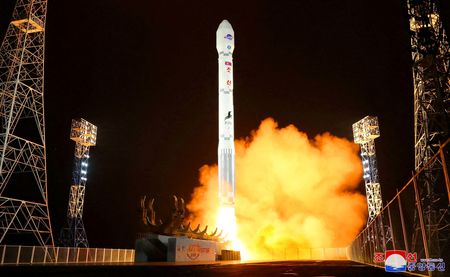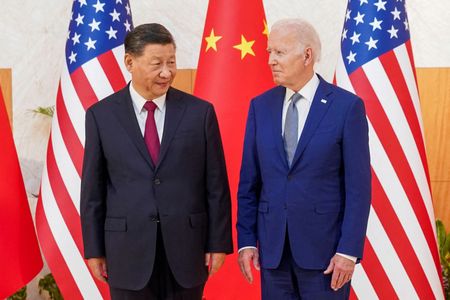By Thomas Escritt and Sabine Siebold
BUERGENSTOCK, Switzerland (Reuters) -Western powers and other nations pushed for a consensus on how to end the war in Ukraine at a Swiss summit on Sunday, but some countries may refuse to back its final conclusions and there was no clarity on whether future talks would involve Russia.
More than 90 countries attended the two-day talks at a Swiss Alpine resort at the behest of Ukrainian President Volodymyr Zelenskiy.
But Moscow, which was not invited and had made clear it did not want to attend, labelled the summit a waste of time and instead put forward rival proposals from afar. China was another notable absentee.
The conference nevertheless underscored both the broad support Ukraine still enjoys from its allies but also the challenges for any lasting ceasefire, with Ukrainian forces on the back foot after recent military reverses and delays to Western aid. Russia controls about 20% of Ukraine.
A draft of the final declaration seen by Reuters refers to Russia’s invasion as a “war” – a label Moscow rejects – and calls for Ukraine’s control over the Zaporizhzhia nuclear plant and its Azov Sea ports to be restored.
The draft, dated June 13, called for Ukraine’s territorial integrity to be respected.
But in line with the conference’s more modest stated aims it omitted tougher issues of what a post-war settlement for Ukraine might look like, whether Ukraine could join the NATO alliance or how troop withdrawals from both sides might work.
The declaration’s wording may fail to achieve unanimous support, Austrian Chancellor Karl Nehammer said.
The summit had also hoped to name the host of another such meeting – possibly Saudi Arabia – but Nehammer said it was too early to say what format such a summit could take and whether Russia would be there. Another intermediary conference without Moscow’s participation might be needed, he said.
“In my view, the communique will not be signed by everyone, because again it’s a question of the specific choice of words, but even those who won’t sign it have all made clear that their position is the same, that the war must end,” he said.
“The more allies that can be found to say ‘Things can’t go on like this’, ‘This is too much’, ‘That’s overstepping the mark’, that also increases the moral pressure on the Russian Federation,” he added.
The Kremlin did not rule out future talks with Kyiv but said guarantees will be needed to ensure the credibility of any negotiations.
A source said it was unclear if Saudi Arabia would be announced at the summit on Sunday as the next host for talks.
Leaders including U.S. Vice President Kamala Harris, German Chancellor Olaf Scholz and French President Emmanuel Macron gathered at the mountaintop resort of Buergenstock in a bid to bolster international support for ending the war.
Many Western leaders voiced condemnation of the invasion and rejected Russian President Vladimir Putin’s demands for parts of Ukraine as a condition for peace.
“The text is balanced, all of our principled positions on which Ukraine had insisted have been considered,” Ukrainian Foreign Minister Dmytro Kuleba told reporters about the final communique to be issued later.
“Of course we…understand perfectly that a time will come when it will be necessary to talk to Russia,” he said. “But our position is very clear: We will not allow Russia to speak in the language of ultimatums like it is speaking now.”
Some leaders departed early, and talks on Sunday turned towards pursuing a joint position on nuclear and food security, and the return of prisoners of war and children removed from Ukraine during the conflict.
FOLLOW-UP
Zelenskiy hailed the summit at the resort overlooking Lake Lucerne as a show of international support for Kyiv, even as some European allies said a broader outreach was needed.
A central ambition of the Swiss and Ukrainian organisers was to announce on Sunday the host country for a follow-up.
Saudi Arabia is one of the favourites, and Foreign Minister Prince Faisal bin Farhan Al Saud said the kingdom was ready to assist the peace process but warned that a viable settlement would hinge on “difficult compromise.”
Striking a balance in the summit’s final declaration between forthright condemnation of Russia’s invasion of Ukraine and wording that commands the broadest possible support has been part of the diplomatic tug-of-war at the event, sources say.
Russia has poured scorn on the summit while China’s decision to stay away dimmed hopes it would show Russia as globally isolated.
“None of the participants in the ‘peace forum’ knows what he is doing there and what his role is,” said Dmitry Medvedev, Russia’s former president and now deputy chairman of the country’s Security Council.
Switzerland also faced some internal criticism. Nils Fiechter of the right-wing Swiss Peoples’ Party (SVP) appeared on broadcaster Russia Today to call the summit a “farce”.
He warned that the summit undermined Swiss neutrality and said Russia had to have a seat at the table.
(Reporting by Steve Holland, Thomas Escritt, Sabine Siebold, Dave Graham, Dan Peleschuk; Writing by Dave Graham and Matthias Williams; Editing by Mark Potter and Hugh Lawson)



